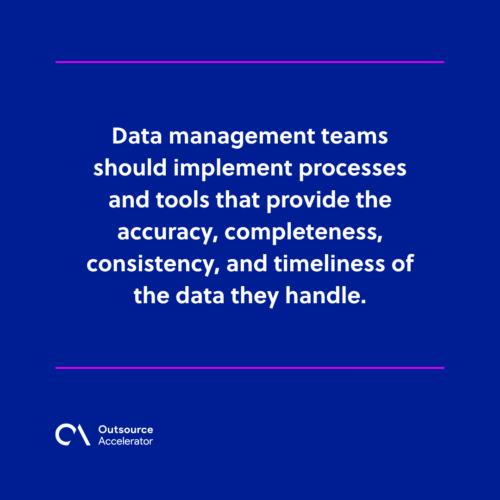Best practices for managing unstructured data

Data has emerged as a formidable force, reshaping industries, revolutionizing decision-making processes, and fueling innovation.
Much of this is unstructured, encompassing textual documents, social media posts, and multimedia files. Unstructured data holds immense potential and untapped opportunities.
Managing unstructured data has become crucial for many organizations receiving increasing daily data. However, most still need to figure out how to do this.
Let’s discuss the key characteristics of unstructured data and its best management practices.
Understanding unstructured data
Unstructured data refers to raw data without a pre-defined format or structure. It can be in the form of text, audio, video, or images and come from various sources.
Unlike structured data, which is organized in specific formats and databases, unstructured data can be stored in various ways. This includes emails and social media posts.

Key characteristics of unstructured data
Unstructured data lacks definite structure, especially those extracted from multiple sources across the web. One good thing about it is that this type of data can be harbored in large volumes and filtered to get better and more valuable information.
More so, unstructured data possesses the following characteristics:
- Complex. Unstructured data contains multiple data types, languages, and formats. This can be interpreted in various ways, making it challenging to analyze and extract valuable insights.
- Unpredictable. Unstructured data can be unpredictable in terms of its quality, completeness, and consistency.
- Time-sensitive. Unstructured data is often time-sensitive, requiring analysts to process them quickly to gain value.
Challenges in handling unstructured data
Managing unstructured data poses several challenges for organizations, including:
Data organization
At first, unstructured data is challenging to organize and categorize. Harboring it in large volumes through big data makes it difficult for organizations to make sense of the data and extract valuable insights.
Data quality issues
Unstructured data often contains errors, duplications, or inconsistencies. It needs to undergo data processing services and procedures to ensure its quality.
Once left unchecked, it results in inaccurate insights and decisions.
Lack of standardization
Unstructured data can come from various sources, each with its format and structure. This can make it challenging to standardize the data and ensure consistency across different sources.
Data integration
Integrating unstructured data with structured data sources is necessary to gain a comprehensive view and perform holistic analyses.
Achieving interoperability and data integration between different data types is a complex task. This can be a challenge for companies handling large volumes of data for the first time.

Privacy and security concerns
Unstructured data often contain sensitive and confidential information. Organizations must implement robust security measures to ensure data privacy, especially when dealing with personally identifiable information (PII).
Managing access control, encryption, and secure data storage becomes crucial to safeguarding unstructured data.
Computational complexity and processing time
Processing large volumes of unstructured data can be time-consuming and may require significant computational resources. Optimizing algorithms and leveraging parallel computing can help mitigate these challenges.
Best practices for managing unstructured data
There’s a way businesses can manage unstructured data without sacrificing its quality, value, and even security.
Here are the following ways to do so:
Use data governance frameworks
Data governance frameworks can help organizations maintain data security and privacy. These frameworks provide a set of policies, procedures, and guidelines for managing data and ensuring its compliance with international standards.
Implement data transformation tools
Especially when dealing with big data, companies should take advantage of using data analytics and transformation tools for their work.
These tools can help them make sense of their unstructured data by analyzing it and extracting valuable insights. More so, it can help identify patterns, trends, and relationships within the data, providing valuable insights to inform decision-making.
Invest in machine learning
Machine learning algorithms help firms manage unstructured data by automating its categorizing and organizing processes.
They can program their algorithms to identify patterns and structures, making searching, categorizing, and analyzing them easier.
Prioritize data quality
Ensuring data quality is critical for effective management of unstructured data. Data management teams should implement processes and tools that provide the accuracy, completeness, consistency, and timeliness of the data they handle.

Foster a data-driven culture
Encouraging a data-driven culture through data literacy can help organizations maximize their unstructured data.
By fostering a culture that values data and emphasizes its importance, organizations can drive innovation, make informed decisions, and stay ahead of the competition.
Importance of unstructured data in today’s world
Unstructured data is becoming increasingly important in today’s world as more and more data is generated from various platforms across the internet. This data type provides valuable insights to inform decision-making and help organizations stay ahead of the competition.
Organizations can gain a competitive advantage by effectively managing unstructured data and making data-driven decisions that drive success.
In conclusion, managing unstructured data can be challenging but a valuable asset for organizations with the right tools and strategies.







 Independent
Independent




